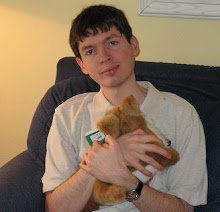I've been continuing my perusal of "Writing Ethnographic Fieldnotes" (WEF) with great interest. The book's writing style is a little dry and sometimes unhelpfully general, but it's been helping me clarify assumptions about what I'm doing when I write -- as well as when I "conduct my research."
The scare quotes are there because what I'm doing is not really ethnography. I'm not going native; I'm not embedding myself in a foreign culture for long enough to understand the culture from the inside out. I certainly don't agree with
Kino that three days is long enough to understand any culture. As a result, when my culture is different from my subject's -- which in one way or another it will be most of the time -- I will lack a certain amount of context. Fortunately, WEF reassures me on every page that the activities and perceptions of an ethnographer are inseparable from the behavior of his subjects anyway, and stresses: don't worry about it, just record it. If you're somewhere in Africa studying an indigenous clan that eats goat colons and they notice the food they're offering you grosses you out, record how you reacted and what they did about it. Their response to you is a source of insight into their culture. (And your reaction is itself a source of insight into you, which is of little concern for an ethnographer but of quite a bit of concern for me, since Lover's Lanes is about me as well as my interlocutors.) This is profoundly relevant to Lover's Lanes; if I commit some kind of faux pas or make an assumption that turns out wrong, it reveals a way my subject's culture is different from mine, which may become a natural angle from which to approach their love story. And if it doesn't, it may at least reveal another way that I'm sheltered, presumptuous, or an asshole, which is painful for me but still makes a good story.
On a related note, WEF makes a big deal about "inscription versus transcription." There is no way, it insists, to transcribe an experience in the field. Even if I copied down all my audio recordings word for word, the record would still lack description of movements and gestures; even if I took a video, the record wouldn't capture my internal state or my subject's. There is no way to show everything. Therefore, the process of writing field notes is a process of inscribing: it's a subjective and skillful act in which I implicitly decide which parts are important, which parts to de-emphasize, and which parts to leave out. I decide how to construct the narrative. (Sometimes a real ethnographer's field notes are not even a narrative, but for my purposes they need to be because I'm telling a story.) This is not really news to me, since I've quite consciously gone through this process twice now, but it's useful to be reminded that there are many ways to spin the same tale. So just as my actions and questions shape my subject's narrative, so my perceptions and choices will shape mine.

No comments:
Post a Comment